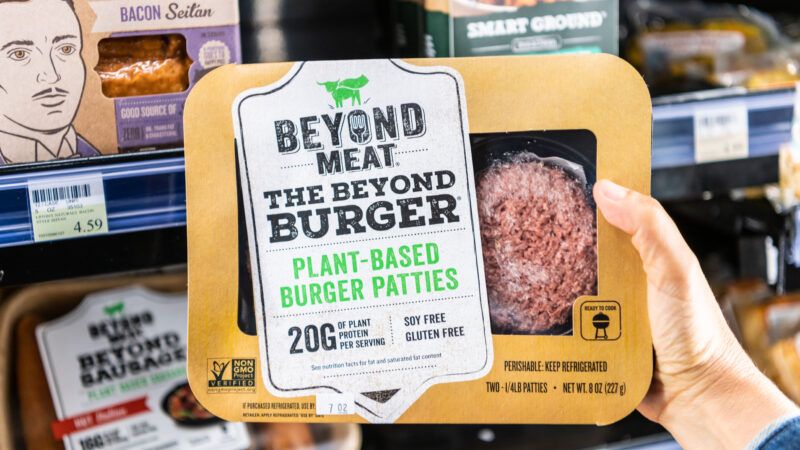Texas Lawmakers Push a Likely Unconstitutional Ban on Plant-Based Food Producers Labeling Their Products 'Meat,' 'Beef,' 'Pork'
Producers of plant-based meats argue these restrictions violate the First Amendment.

Calling it Beyond Meat may soon be beyond the law in the Lone Star State. A bill advancing through the Texas legislature would pile new regulations on how the makers of plant-based and lab-grown foods could label their products.
On Monday, the Texas House of Representatives passed H.B. 316. The bill amends the state's food labeling laws to prevent newly defined "analogue" foods—a category that includes products from companies like Impossible Foods and Beyond Meat—from using terms like "beef," "meat," and "pork" on their packaging.
Plant-based food producers could still use terms like "burger," according to The Dallas Morning News. But any such analogue burger or sausage would need to have "plant-based," "meatless," "made from plants," or "a similar qualifying term or disclaimer" prominently displayed on the label. H.B. 316 would apply similar restrictions to lab-grown meat, which would have to come with a "lab-grown" or "cell-cultured" label.
The market for fake meat products has grown says Scott Weathers, senior policy specialist for the Good Food Institute (GFI). Research from GFI shows that the market for plant-based meats grew 27 percent in the past year. That growth, he says, has produced a backlash from the producers of conventional meats. "Legislators who've introduced these bills have said their intent is to protect the traditional agricultural industry."
Indeed, H.B. 316 has the vocal support of ranchers and pork and poultry producer associations. They say their intention is to clear up any confusion consumers might have over whether Benevolent Bacon comes from pigs or not.
"It's simple: Soy is not meat. Beans are not meat. Cells grown in a petri dish on artificial nutrient solutions are not meat," wrote Judith McGeary, executive director of the Farm and Ranch Freedom Alliance in a public comment in support of H.B. 316. "Labels that imply in any way that these products are equivalent to meat from livestock are false and misleading."
"As technology advances and food products for consumption are created using alternative ingredients and methods, Texans need the ability to make the distinction between meat originating from a carcass, meat substitutes, and cell-cultured products," reads a committee report on the bill. Its primary author is Rep. Brad Buckley (R–Killeen).
Opponents of the bill argue that the proposed regulations would do more to confuse than to clarify what consumers are buying. "Calling the burger 'plant-based meat,' combined with the ground beef appearance of the burger, lets home cooks know what to do with the burger when they unwrap it: cook it like they would ground beef," said Chuck Mains of Impossible Foods in a public comment on the bill.
Texas's bill is part of a trend. State legislatures across the country have introduced or passed bills regulating how plant-based foods can be labeled. Most have been the subject of lawsuits from plant-based food producers who argue that labeling restrictions violate their First Amendment rights to free speech.
"The First amendment turns on what a reasonable consumer will understand. If a reasonable consumer understands what you're saying, then the government isn't allowed to make you change what you're saying," says Justin Pearson, an attorney with the Institute for Justice. "Just like reasonable consumers understand that chickens don't have fingers, and you shouldn't wear cotton candy, a reasonable consumer understands these plant-based meat terms."
As such, courts have generally been receptive to lawsuits challenging these labeling laws, he says.
In 2019, the makers of Tofurkey managed to get a preliminary injunction preventing Arkansas from enforcing its law prohibiting the vegan food maker from using terms like "chorizo," "ham roast," and "sausage" in its labeling, reports the Arkansas Democrat-Gazette. That same year, an Institute for Justice lawsuit prompted Mississippi to change its restrictions on plant-based meat labeling.
A federal judge blocked California from enforcing labeling restrictions on a vegan butter maker last year.
The same logic undergirding these court decisions would likely make Texas' law unconstitutional as well, says Pearson.
A case in Missouri brought by Tofurkey against that state's plant-based meat labeling law is ongoing. The Institute for Justice is currently suing Oklahoma over additional labeling requirements it slapped on vegan food sellers.
Having passed the House of Representatives, H.B. 316 now heads to the Texas state senate.
